Mark Stay's Blog, page 14
November 26, 2024
Aliens Cookbook (and Claire!) on Authorized
The Authorized podcast celebrates Thanksgiving with an Alien cookbook special! Using the rather baffling instructions in the Official Alien Cookbook we were challenged to cook/bake recipes from the book.
Fellow guests Patrick Willems and Sarah Welch-Larson took up the challenge with aplomb. Me? I can’t cook or bake for toffee, so I called in an expert: namely my wonderful wife Claire. She made two magnificent face-hugger recipes. The Invasion of Pot Pies and the Pear and Cardamom Upside Down Cake (photos below…) and they were very yummy indeed.
You can listen to the podcast on your favourite podcast provider, and if you want to skip ahead to Claire’s bit, it’s at around 1 hour 14 minutes. Bon appetit!
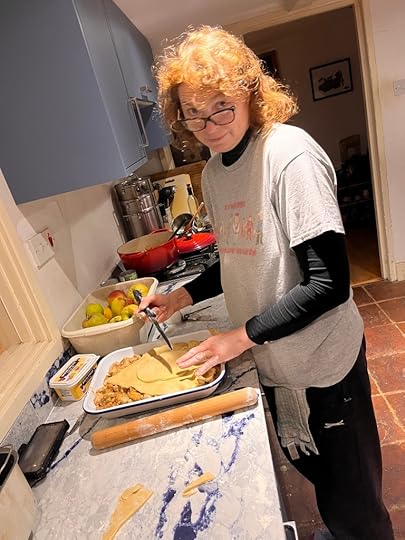 Genius at work…
Genius at work…
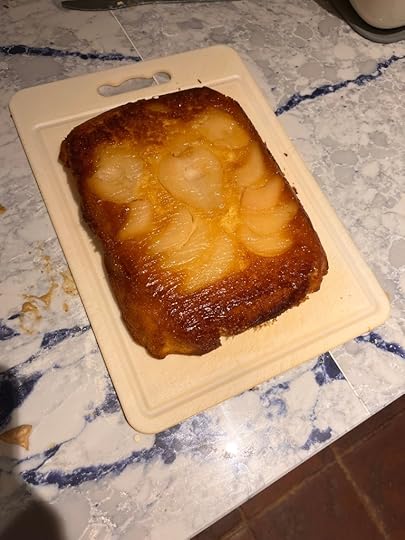 Pear and Cardamom Upside Down Cake a la Facehugger
Pear and Cardamom Upside Down Cake a la Facehugger
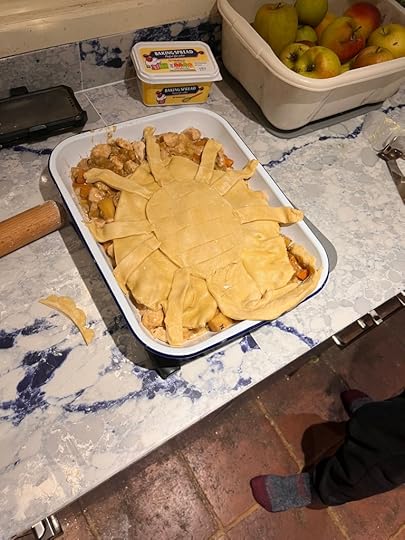 Invasion of Pot Pies Facehugger pre-oven…
Invasion of Pot Pies Facehugger pre-oven…
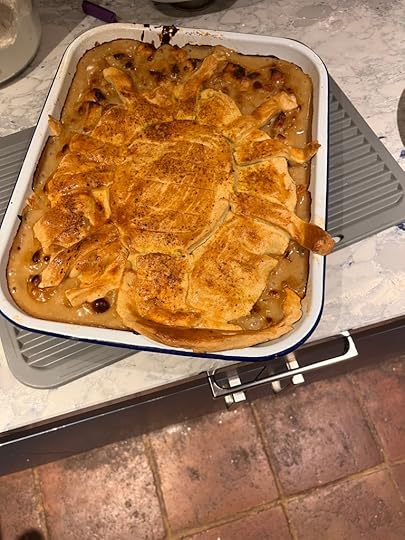 And Invasion of Pot Pie Facehugger cooked!
And Invasion of Pot Pie Facehugger cooked!
November 22, 2024
Write, Damn It!
In a sort of podcast exchange scheme, I was delighted to be invited on Zoë Richards’ Write, Damn It! podcast (she, of course, came on my Creative Differences podcast last month).
We discuss self-publishing and the quirks of traditional publishing and… I also sound quite maudlin at points as I was in something of a low point when we recorded this as you’ll hear (though chatting with Zoë cheered me up no end). So if you want to hear me to sound a little bit like Marvin the Paranoid Android, then do check it out…
LISTEN TO THE WRITE, DAMN IT! PODCAST HEREhttps://www.buzzsprout.com/2170844/episodes/16153638And don’t forget, you can watch my Creative Differences interview with Zoë here…
Or…
LISTEN ON YOUR FAVOURITE PODCAST PROVIDER HERENovember 21, 2024
Robot Overlords on Authorized
Long time readers of this blog will know that I’ve been a guest on the Authorized podcast quite a few times. I love Andrew, Hannah and the gang and have nothing but respect for the passion and literary rigour they bring to the podcast with their love of film novelisations. So to have an entire episode dedicated to the Robot Overlords novelisation was a real honour, especially as the film celebrates ten years since its premiere at the London Film Festival.
What’s unusual about this episode is that I’m not in it for the first couple of hours (yes, it’s nearly three hours long!). Understandably, they wanted to discuss the book without the author simpering in the corner, but they also brought on my old chum Paddy Eason, the VFX supervisor on the film to give an insider’s view to the making of the film. They say lots of very nice things about the book, which is going to make me completely unbearable for a few days at least, and they reveal connections to Psycho, Mad Max, Planet of the Apes and Pixar’s Cars. Do please enjoy…
And if you fancy reading the book, you can get signed copies of the paperback from me here…
ROBOT OVERLORDS SIGNED PAPERBACK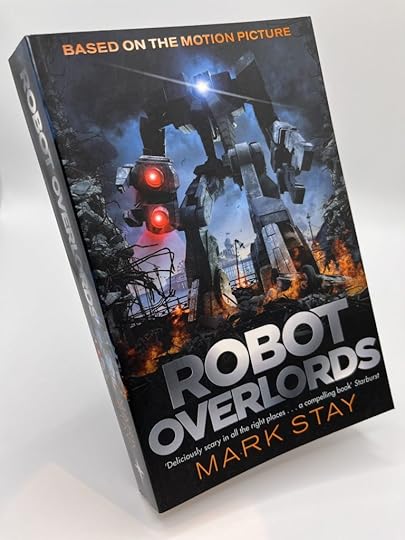
November 15, 2024
My Biggest Mistake as a Writer: Zoë Richards
This month’s special guest Zoë Richards reveals the biggest mistake in her writing career…
TRANSCRIPTMARK: What’s the biggest mistake you’ve ever made in your writing career?
ZOË: Doubting myself. So, many years ago, and I’m talking. I think, around about 22 years ago,
Writing Magazine had an offer from an agent that you could send in up to 3000 words. So I sent off to her 3000 words, and she came back. And now I reflect backwards and it’s like, oh, she gave me such incredibly good advice, but I didn’t get the “Well done, Zoë, you are a Gold Star student.” So because because I was brought up with the coercive control of “you are not good enough unless you are the star student.” When I came home second in the year, I’m sure you can guess where this is going. Second in the year out of 145 kids and I said I came home I came second in geography,
and my dad’s answer was, “What are you going to do next year to be first?” And there wasn’t a smile
in that response. So I was always expected to be the best in class. So this agent didn’t
make me best in class. So I believed I wasn’t a writer and I didn’t write for a few years. So I would say, anybody who gets rejection, remember, first off, if they give you a nuggets, store the nugget. You might not be able to accept what they’ve told you today, but at some point you’ll be ready to accept what they’ve told you. And she told me, was write what you know. I can tell that you’re writing something now that you don’t know anything about it. So either write something
you already know about or go and research what you’re trying to write about. And I took it as being, I’m no good at writing. She wasn’t telling me I was no good at writing. She was telling me it was obvious I didn’t know what I was writing about. And they’re are two distinctly different things. So anyone listening who’s thinking, oh, I’m useless because I’ve had a rejection: what are they telling you? And then secondly, it’s only their opinion. And if you are 100% sure you’re right
and you’ve written good stuff, keep going. But I think we’ve always got room to improve.
MARK: Now, listeners, if you’re thinking this is incredibly good advice where I can get more of this? You have a podcast, don’t you? So let’s give that a quick plug. Zoë, tell us about Write, Dammit.
ZOË: Well, yeah, it’s called Write, Dammit because I needed to remind myself to write, dammit. And I actually did the podcast because the government created something called Integrated Care Boards, and the one I worked for was told it was over establishment and needed to reduce its numbers. So a load of us were made redundant. Nobody’s ever made redundant in the NHS, so it was a bit of a shock to us all. And I was doing a job I loved with colleagues I adored. And so I thought, well, I can’t sit around and do nothing whilst I’m looking for a job and bear in mind; my kind of job, I was the only one in the country, so not the kind of job that you can get lots of work doing. So it was very, very difficult for me to find an identical job. I was having to reinvent myself. So what I did instead was start a podcast, and I learned what I could and discovered that if I could do seven, no, if I could do eight podcast episodes I was doing better than most because the majority of people stop at seven episodes or three months of running a podcast. So I said, right, I’m doing it for four months, and I’m going to do eight episodes. So we’re now on episode 127 and it’s 18 months old.
MARK: Yeah, this is episode three and I’ve still got the will to live, so I think we’re doing alright.
ZOË: Yeah, you’ve done one before though. I think you’ll keep this one
going for sure.
November 13, 2024
Coming Soon on the Creative Differences Podcast: Mike Shackle!
Welcome to Mark Stay’s Creative Differences, a monthly livestream where I talk to writer friends about those little things that make a big difference to their craft and careers in the hope that we can give readers some insight to the creative process, and writers and other creative folk some practical advice that they can actually use!
For the next livestream recording on TUESDAY 19TH NOVEMBER, 2024, I’ll be talking to MIKE SHACKLE! Mike is the author of the LAST WAR fantasy trilogy and he writes crime thrillers as Michael Dylan. Originally from London, Mike Shackle has lived in Hong Kong, Singapore, Beijing, New York and Dubai before settling down with his family in Vancouver. In that time, he’s sold washing machines, cooked for royalty, designed a few logos, and made a lot of ads. Ideally, he’s happiest day dreaming over a cup of tea. I hope you can join us live!
you can listen to previous episodes hereOR WATCH THEM ON YOUTUBENovember 12, 2024
When Do You Know When You’re Ready to Start Writing a Novel? Zoë Richards
This month’s special guest Zoë Richards reveals what she needs to know before she can start a writing project…
TRANSCRIPT
MARK: What’s the thing that makes you think you’re ready to start writing on a project?
ZOË: The thing that makes me say, just go for it: I’ve got to know what the ending’s going to be. Once I know where this is going. And I think, again, that goes back to reports that I used to write. So what do I want out of this report? I want the execs to give me 3 million pounds for autism services. I have to say, spoiler alert, I never got 3 million pounds for autism services for children. It never, never happened. Great report, Zoë, the best we’ve ever seen. No, we haven’t got any money for you. Yeah, that didn’t work. However, the process worked of knowing that’s my ultimate aim, that I need them to know that that’s what we need, what’s going to get me there. And so it’s the same thing when I’m ready to write. Once I know where I’m going,
LISTEN TO THE EPISODE ON YOUR FAVOURITE PODCAST PROVIDEROr watch the whole episode on Youtube…
How Much Does an Author Earn From Each Book Sale?
When you buy a book, how much of what you’ve paid goes to the author…?
I go into advances, royalties and other ways that authors make money in this post: Author Advances, Earning Out and Royalties explained…
November 9, 2024
Zoë Richards: An Easy Tip for Writers
Zoë Richards reveals the small thing that makes a big difference to her writing…
LISTEN TO THE WHOLE PODCASTOr watch the whole interview on Youtube..
TRANSCRIPTMark: What small thing has made a big difference to your creative process?
Zoë: Just sitting down and writing? The only thing that ever stops me because I find I get more creative the more I write.
Mark: Yeah, yeah.
Zoë: It’s a bizarre thing, isn’t it? So if I sit there and don’t write, the writing doesn’t get done. And the creativity doesn’t happen either.
Mark: You can’t just sit down, not do anything, get up and walk away. It’s just embarrassing for all concerned, even if you’re completely on your own. So yeah, turn up sharp, tap some keys, see what comes out.
Zoë: I couldn’t think of anything to start today, and I actually wrote Need Something about Hunter and his gang days, and perhaps something about when his dad used to beat him up. And that’s all I’ve written into one of the chapters, but it immediately made me go, oh, in that chapter there, I need to do… And I just went off then and couldn’t stop writing.
Calling Fleetwood Mac Fans…
I’ll be interviewing bestselling author Lesley-Ann Jones about SONGBIRD, her remarkable new biography of Fleetwood Mac’s Christine McVie.
28 Nov 2024, 18:30 – 20:00Little Green Bookshop, 38 High St, Herne Bay CT6 5LH, UKThe book celebrates the life of the iconic Christine McVie – quintessential English rock star, backbone and the beating heart of Fleetwood Mac.
Witten by the author who was friends with Christine, and with contributions from those who knew her best, Songbird offers a true insider’s view, and deep psychological insight into both the woman and musician.
The event will also feature a fun quiz on Fleetwood Mac, perfect for fans and music lovers alike! Don’t miss this opportunity to hear insights from one of rock’s legendary voices while testing your knowledge about the band.
GET TICKETS HERE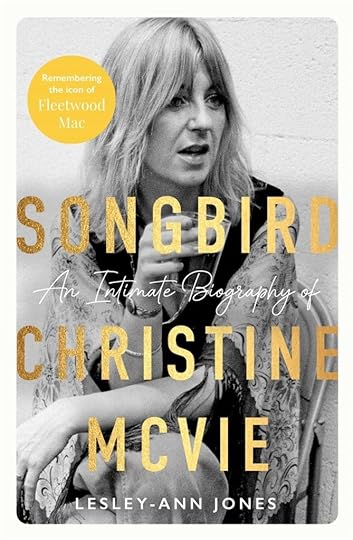
November 7, 2024
Tips for Writing a Synopsis with Zoë Richards
This month’s special guest, Zoe Richards is unusual in that she loves writing a synopsis. Here, she gives us a few top tips…
TRANSCRIPTMark: You recently tweeted, “Am I weird in that I quite like writing a synopsis?” Yes you are.
Can we discuss what it is you like about writing synopses and any top tips for writing them?
Zoë: Again, I think it might be my career that helps are the reports I would write. I always had to write an executive summary to the report, so that meant that I had to take something that was anything from a three to six page report. So we are talking short compared to a novel, but often
my reports would start at twenty pages, and then I’d whittle it down to what’s the real crucial information these exactly need to read. And then I’ve got to produce something like about a one-hundred word, a summary synopsis of what the report’s about, but one that is going to make them
want to read the rest of the report. Because they receive so many reports, they’re not going to want to read it. So I do have an advantage, don’t I? Do you use, Scrivener?
Mark: I do indeed, yes. Big fan.
Zoë: So, you know, on the way I’ve set mine up, you know, on the top right corner
it has a little box that says synopsis when you’re writing each chapter.
Mark: Yeah, yeah, yeah, yeah, yeah.
Zoë:So I just write a sentence or two in there about what’s the purpose of this chapter. And then once you’ve got all of your chapter one or two sentences, I mean, the idea of it being
there is for the corkboard, but actually forget the corkboard. It’s a place for you to then gather…
So I’ve just written a chapter today, and the chapter is to to raise the emotional stakes in the story. So I’ve written a couple of lines in, into that little corner box that’s headed ‘synopsis’ and then when I come to write the synopsis, I just pull all of these sentences out. If I can’t necessarily add anything to the synopsis through adding in what that chapter is about, then it doesn’t need to go in the synopsis. So is it moving it forward? But also if it’s not moving the story forward enough, do I need the chapter? So it helps me to do that kind of thing as well.
Or watch the whole interview on Youtube:



